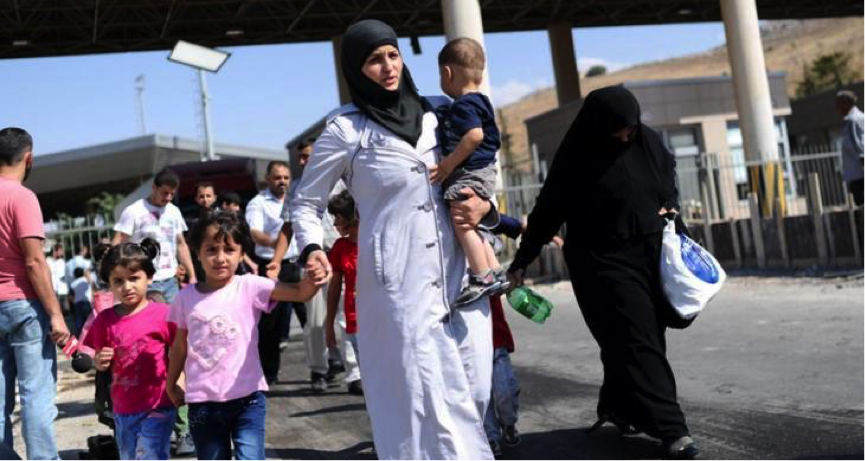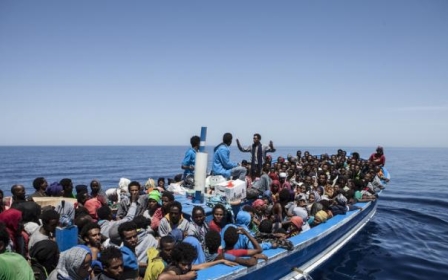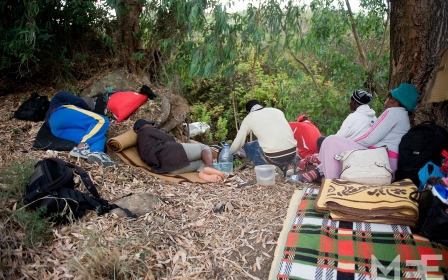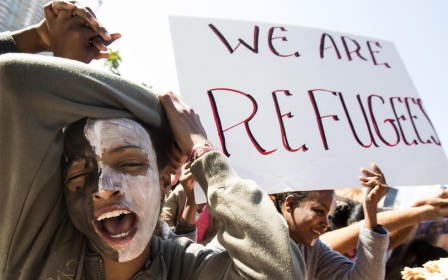Alexandria: A refuge and a gateway to tragedy for Syrians

The body of Raghad Hasoun was placed in a flour sack, weighed down with bits of metal, and slipped into the water.
Raghad, an 11-year-old Syrian refugee girl from Aleppo, died at sea this month - not by drowning but because smugglers threw away her luggage after leaving the Egyptian coast, leaving her without the insulin medication she needed to survive the Mediterranean crossing. The story reached Save the Children when her family arrived at the shore in Augusta, Sicily. The story has been corroborated by prosecutors in Syracuse, using several eyewitness testimonies.
The tragedy illustrates further the risks that Syrian refugees face after they decide to migrate from Egypt, a country where financial instability and dim prospects for the future are pushing yet more people towards the risks of the “death boat”, even though stories like Raghad’s are common knowledge within the community.
Abu Maher and his family were caught on a fishing boat off the coast of Alexandria on 8 July. The owner of a garment factory in Damascus that was bombed out during the civil war, he told Middle East Eye about the cumulative problems of life in Egypt that finally pushed the family towards a journey “that we know often ends in death”.
“The UN cut off [our] food voucher assistance, and then our landlord raised the rent. Everything was going up in price - water, electricity, things we use on a daily basis,” he said. “Things were only getting worse. We got sick of it.”
Speaking by telephone from a cell in the police station in the Karmouz quarter of Alexandria after his arrest, Abu Maher recounted stories of life in a neighbourhood of the city; his children being bullied at school and sexually harassed in the street, the struggles to get medication for his young daughter or treatment for his autistic son, the rising spectre of debt and financial instability. Abu Maher’s hopes for a legal route to Europe, through resettlement, had also been disappointed - despite having registered with the UNHCR three-and-a-half years ago.
The boat was a way out, and the father of four also saw it as the only alternative left.
“Because of all these circumstances, we took the decision to go to Europe,” Abu Maher said. “We even borrowed money from people to do it … from friends. We promised we’d return the money when we got [there].”
Now Abu Maher and his family are awaiting release from Karmouz. It appears that this will likely happen within the year, thanks to better coordination between the UNHCR and the Egyptian government. It is one way in which conditions have improved, because Syrians are now less likely to face deportation - or “voluntary repatriation” - to Turkey (or before that, Lebanon) once they are detained for irregular migration.
“We’ve noticed that the authorities are taking a more positive attitude towards those detained for irregular departures, in spite of the increase in arrests and incidents,” said UNHCR Egypt’s spokesperson, Marwa Hashem, adding that UNHCR has “regular coordination” with the authorities in Cairo and Alexandria.
“We are happy to have better coordination and that the releases are more regular. [Irregular migrants] tend to stay 10 days to two weeks in detention and then they are released.”
There are still cases of extended administrative detention and deportations. According to UNHCR data seen by MEE, more than 30 asylum seekers registered with UNHCR, and more than 100 non-registered irregular migrants, have been deported since the beginning of the year.
But what about the Syrians who aren’t taking boats?
Until now, one of the most extensive pictures of Egypt’s Syrian refugee population can be found in a September 2014 study by Maysa Ayoub and Shaden Khallaf from the American University of Cairo’s Centre for Migration and Refugee Studies (CMRS). The study, based on a 310-household survey, focus group discussions and in-depth interviews with key Syrian informants, all conducted in three stages between May 2013 and May 2014, found that reasons for Syrian migration included “the hate speech campaign waged against [Syrians after Egyptian president Mohamed Morsi’s overthrow] … negative attitudes of a good part of the public, and worsening economic conditions”.
Just over 45 percent of the surveyed sample stated that work was their only source of income, while “the rest either depended on a combination of work, financial aid, and/or withdrawing from savings to sustain their livelihoods,” the study found, while “a very small percentage depended on money transfers from outside Egypt as their only source of income”. Just over 14 percent (44 households) reported zero income.
Ayoub and Khallaf’s research meanwhile found that to overcome challenges of covering low income and high prices, most of the Syrian refugees interviewed “indicated that they used family savings, while a lower percentage borrowed money from relatives and friends”.
Although some of the factors have changed - such as the post-Morsi xenophobia - this picture fits with the often-repeated presentation of Syrians in Egypt as more middle class and better off than refugees in, for example, Lebanon. They were able to fly to another country and try to set up a new life there.
But savings do not last forever, and refugees’ protracted financial instability is not being helped by cuts made by international organisations, which are struggling to foot the bill for refugees now in their fifth year of diaspora.
At the beginning of the year, the UN’s World Food Programme (WFP) made a 40 percent cut in food voucher assistance to 80,000 Syrian and 3,500 Palestinian-Syrian refugees in Egypt. United Nations High Commissioner for Refugees, Antonio Guterres, meanwhile said in mid-July that UNHCR’s $5.5bn appeal to support Syrian refugees in 2015 is currently less than 25 percent funded. The UNHCR is providing cash assistance to about 26,000 Syrians in Egypt.
UNHCR’s Hashem admits that socio-economic problems and the impact of this funding crisis will “definitely” encourage irregular migration from Egypt this year. “It will be a reason that people will attempt to leave. We expect this will increase.
“What we’ve been seeing now is that more people are vulnerable - vulnerability is increasing. People just came out of Syria with some savings, if they had them,” she told MEE. “Funding shortfalls” at UNHCR and other international organisations are failing to address this growing vulnerability, she said.
That said, not everyone wants to leave.
Ubiydah is a medical student from Homs who came to Egypt via Kuwait in 2012, after discovering that he was wanted by two intelligence agencies in Syria for his role in campus activism and street demonstrations against President Bashar al-Assad’s government.
Speaking outside a downtown Cairo cafe staffed by Syrian refugees, many of them with qualifications above and beyond making mint tea, Ubiydah told MEE that he will never try the sea, even though a handful of his friends have successfully made the journey since 2013. He will continue his studies at an Egyptian university this autumn. Referring to the anti-Morsi protests in Egypt two years ago, he said life in Egypt is “not like before 30 June [2013], but it’s still good”.
“People thought that Europe was like heaven for us,” he told MEE. “For me, I will never go on a boat to Europe. If I get a student visa or a work visa, I may go. But the boats? Never. I will not put my life in danger just to reach Europe.”
Ubiydah admits that his situation is probably better than that of many Syrians in Egypt because each month he receives money from his father in Kuwait, so he has no need to work and can focus on his studies.
“But most of the people who came here, who are living in 6th of October City or Faisal [in Giza] or poor areas in Maadi, they don’t have the support of families outside. Many of them struggle to find work and depend on their vouchers from UNHCR. For them, going to Europe is the only choice.”
Mohamed Abdel Salam, a migration researcher and activist from Alexandria, said the Egyptian government is now in a position to do more.
“Now I think the conditions are better [for Syrians]. There is no more propaganda; the military has lost its doubts about the Syrians and their [alleged] support for the [Muslim] Brotherhood. We can say that it’s less dangerous for Syrians than before.”
Abdel Salam suggests Egypt should now introduce “new public policy … to arrest and stop the smuggling networks, allow free movement and more jobs to Syrians.” Other projects could include supporting small Syrian businesses, improving integration in Egyptian society through cultural projects and addressing irregular migration, he said.
“We have to work together with the Europeans, the Egyptians and Syrians to help the lives of Syrians rather than having them dying in the sea.”
Although irregular migration from Egypt has often been presented as a largely Syrian issue, this year refugees and asylum seekers from Sudan are the highest represented nationality in migration flows from Egypt - an estimate based on the composition of irregular migrants appearing in detention after trips are stopped and apprehended by the authorities.
According to UNHCR data, up until mid-July, of 1,587 total detentions on the north coast this year, 663 were Sudanese and 335 were Syrian. More than 1,800 have now been detained in total this year.
This composition could change during the summer months, generally seen as the safest time to cross the Mediterranean. At the same time, some observers suggest more Syrians may be trying to cross from Turkey and Greece, a route which this year has overtaken the central Mediterranean (Egypt and Libya) as the main way to Europe.
Abu Maher says he and his family will return to their neighbourhood in Alexandria after they are released. Ubiydah, meanwhile, is set on going back to university and getting on with his education.
Both will try their luck in Egypt - two divergent stories in the increasingly complicated life of Egypt’s Syrian diaspora.
Middle East Eye propose une couverture et une analyse indépendantes et incomparables du Moyen-Orient, de l’Afrique du Nord et d’autres régions du monde. Pour en savoir plus sur la reprise de ce contenu et les frais qui s’appliquent, veuillez remplir ce formulaire [en anglais]. Pour en savoir plus sur MEE, cliquez ici [en anglais].




